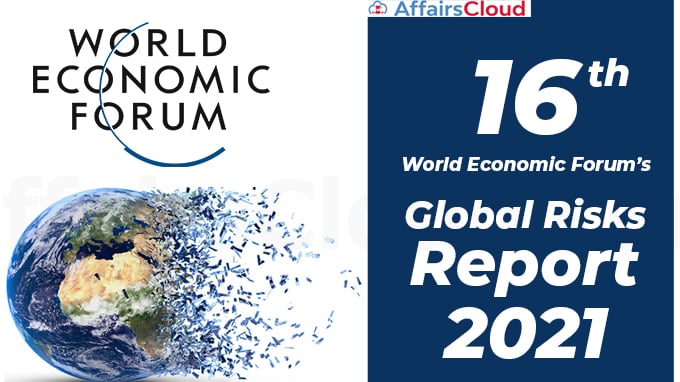 The World Economic Forum (WEF) has released the Global Risks Report 2021, 16th Edition. The findings of the report are based on the Global Risks Perception Survey (GRPS) undertaken by over 650 members of WEF’s diverse leadership communities.
The World Economic Forum (WEF) has released the Global Risks Report 2021, 16th Edition. The findings of the report are based on the Global Risks Perception Survey (GRPS) undertaken by over 650 members of WEF’s diverse leadership communities.
- The Report is prepared with Strategic Partners, Marsh McLennan in Partnership with SK Group and Zurich Insurance Group.
- The report is being released before WEF’s upcoming virtual Davos Agenda scheduled to be held between January 25-29, 2021.
- The main objective behind the publishing of the report is to enable better preparation by Government & other International Communities during the times of crisis
The report has ranked Risks based on Survey
| Nature of Risks | Time Period | Top 3 threats ranked by Correspondents in Survey |
|---|---|---|
| Clear & Present Dangers (Short Term) | 0-2 Years | Infectious Diseases, Livelihood Diseases & Extreme Weather events |
| Knock-on effects – cumulative effect (Medium Term) | 3-5 Years | Asset Bubble Burst, IT Infrastructure Breakdown & Price Instability |
| Existential Threats (Long-Term) | 5-10 Years | Weapons of Mass Destruction, State Collapse, Biodiversity Loss |
i.The Survey respondents also assessed Individual Global Risks based on Likelihood & Impact
- The Top 3 Risks by Likelihood (Very Likely to happen in the next 10 years) are Extreme Weather, Climate Action Failure & Human Environmental Damage
- The Top 3 Risks by Impact (amount of impact they are expected to create) are Infectious diseases, Climate Action Failure & Weapons of mass destruction.
ii.Widespread Effects:
COVID-19 has brought a major change in the 2021 rankings compared to Global Risks Report Rankings of 2020.
- In 2020, Infectious diseases was ranked 10th in the list of most critical threats.
- COVID-19 has caused both widespread loss of life & delay of economic development in poorest parts of the world, thus amplifying wealth inequalities across the world.
ii.Climate Concerns:
Even though the carbon emissions have seen a decline due to lockdown & disruption due to Lockdown, they are expected to increase when the recovery process starts.
iii.Process to Counter Risks:
The report has stated the Global Communities to draw lessons from the responses to COVID-19 to boost the Global Resilience in future. This includes
- Formulating Analytical Frameworks
- Creating new forms of partnerships
- Building trust through clear & consistent communication.
Click Here to read the Full Report
Recent Related News:
i.October 21, 2020, According to the Third Edition of “The Future of Jobs Report 2020” released by the WEF, COVID-19 and Technological Advances will disrupt around 85 Million Jobs by 2025.
About World Economic Forum (WEF):
Founder and Executive Chairman – Klaus Schwab
Headquarters – Cologny, Switzerland




